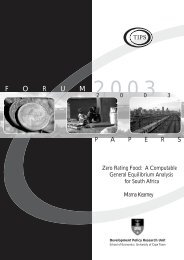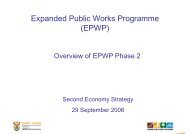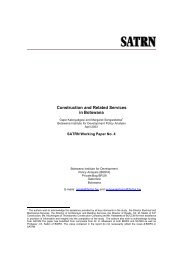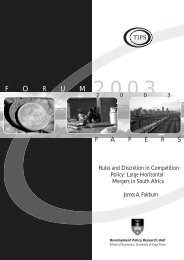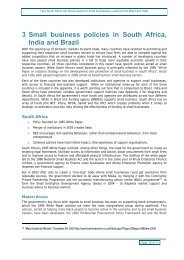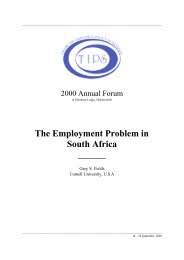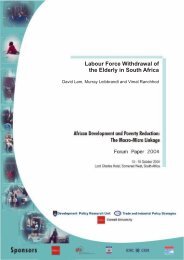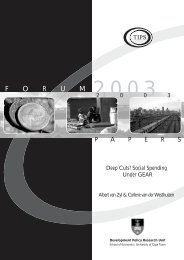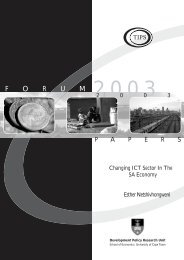(AsgiSA) Annual Report 2008 - South African Government Information
(AsgiSA) Annual Report 2008 - South African Government Information
(AsgiSA) Annual Report 2008 - South African Government Information
You also want an ePaper? Increase the reach of your titles
YUMPU automatically turns print PDFs into web optimized ePapers that Google loves.
Accelerated and Shared Growth Initiative for <strong>South</strong> Africa<br />
ANNUAL REPORT<br />
<strong>2008</strong><br />
6. Industrial policies<br />
6.1 Background<br />
<strong>AsgiSA</strong> proposed that the State adopted a more active industrial policy to move the economy<br />
towards increasingly inclusive growth. Industrial policy refers to measures targeted at ensuring<br />
a more efficient economy. A particular aim is to address the constraints to growth<br />
in sectors that can diversify the economy and provide sustainable employment on a large<br />
scale. Industrial policy in this sense relates not to manufacturing industry alone, but to the<br />
economy as a whole, including agriculture, mining and services.<br />
In <strong>South</strong> Africa, industrial policy has to take on two core challenges. On the one hand, products<br />
of the mining value chain, including refined metals and coal-based chemicals, account<br />
for substantially over half of all exports. This situation leaves the economy dependent on<br />
world commodity prices. That was highly beneficial during the commodity boom between<br />
2002 and 2007. However, it proved less desirable when, as in the past year, commodity<br />
prices declined. Furthermore, the minerals value chain is mostly capital-intensive and unable<br />
to create employment on a large scale.<br />
On the other hand, <strong>South</strong> Africa has very low employment by world standards. Less than half<br />
of all working-age adults have some kind of gainful employment, compared to an international<br />
average of around two thirds. But new economic activities that could generate more<br />
opportunities for lower-skilled and relatively inexperienced people require government support.<br />
In particular, the State must often provide appropriate infrastructure and assist with<br />
access to input, credit, technology, marketing systems and training.<br />
<strong>AsgiSA</strong> pointed to cross-cutting strategies needed to improve the efficiency and equity of<br />
the economy, including reductions in the cost and improvements in the quality of economic<br />
infrastructure; reduced regulatory burdens and delays; a stronger competition policy to address<br />
excessive concentration of ownership in upstream and some wage-goods industries,<br />
where monopoly-pricing can inflate costs across the economy; and incentives for research<br />
and development. In addition, it emphasised Broad-Based Black Economic Empowerment<br />
(BBBEE) to encourage transformation of industries beyond the transfer of equity.<br />
62



